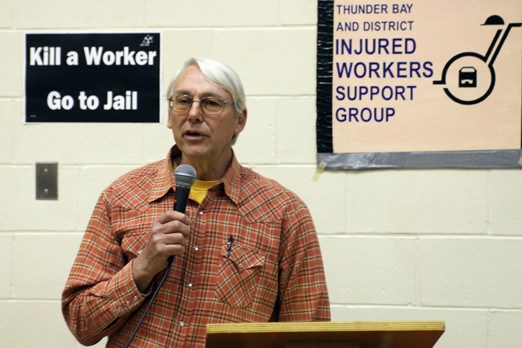THUNDER BAY – A plan to distribute WSIB surpluses to employers has outraged workers' groups, who say the payouts to business come on the backs of injured workers.
The provincial government is exploring legislative changes that would allow distribution of surpluses under the Workplace Safety and Insurance Board program back to employers, concluding a consultation process on the plan this week that labour groups claimed deliberately excluded them.
The plan comes after the WSIB in 2019 eliminated its unfunded liability – the gap between projected future costs and current funds. The unfunded liability rose as high as $14.2 billion in 2011.
At a virtual event Tuesday, local and provincial workers’ groups argued the elimination of the unfunded liability – and the payouts to employers now being contemplated – were enabled by punitive WSIB practices that deny workers rightful benefits.
Any surplus, which the groups said could be in the billions, should instead be redirected to address longstanding concerns with the compensation system, they argued.
“There’s no reason for them to not be putting the money back onto the benefits of injured workers,” said Janet Paterson, president of the Ontario Network of Injured Workers Groups (ONIWG).
Employers have already seen WSIB premiums cut significantly in recent years, advocates noted.
In 2019 alone, the province cut average premium rates by nearly 30 per cent, with a total reduction of over 47 per cent since 2016, according to the WSIB.
It’s a longstanding trend, with average premiums falling from $3.00 per $100 of payroll in 1996 to just $1.37 per $100 of payroll by 2020.
Meanwhile, many injured workers aren’t seeing the benefits of the system, advocates said.
A 2015 study found 46 per cent of injured workers live in poverty five years after their injury, long-time advocate Steve Mantis of the Thunder Bay and District Injured Workers Support Group said Tuesday, addressing a virtual group that included MPP Judith Monteith-Farrell.
“This is what happens to injured workers,” he said. “While the government is planning to give billions of dollars back to big corporations, 46 per cent of workers who really need the help, who are disabled for life, are living in poverty.”
His group has long called on the province to eliminate “deeming,” change policies on pre-existing conditions, and give more weight to the assessments of health care workers treating workers, rather than its own doctors.
Advocates including health workers have called for investigations of the WSIB, saying it too often ignores workers’ physicians and blames pre-existing conditions in order to reduce benefits.
The practice of deeming, allowing the WSIB to conclude a worker could return to a hypothetical job, has been heavily criticized.
“Our government must pass Bill 119 which will put an end to deeming, only allowing it when an appropriate job offer is declined,” the ONIWG said in its submission to the province on its surplus consultation.
The government's surplus proposal would see the WSIB distribute funds back to employers when its “sufficiency ratio” – a percentage measuring its total net assets against total net liabilities – hits a certain range.
At 115 per cent sufficiency, the WSIB would have discretion to issue surpluses; at 125 per cent sufficiency, it would be required to do so. As of March 31, the WSIB had a 118.1 per cent sufficiency ratio, the province said.
The practice is common, the government argues, saying provinces like Alberta, Manitoba, Saskatchewan, and Prince Edward Island have all passed surpluses to employers.
Still, it rankles workers who say they’ve struggled to find basic support after serious injury.
“I’m appalled to think overpaid CEOs will be receiving bonuses from the very people who helped get their companies where they are today, who are now left injured, sickened, and impoverished,” said Ted Bowbrowski, president of the Thunder Bay and District Injured Workers Support Group.
Problems with the WSIB span decades and multiple governments, advocates said, though the Ford government drew particular scorn.
Patty Coates, president of the Ontario Federation of Labour, said Tuesday a lack of consultation on the surplus issue was simply par for the course for the government.
“In this case, I almost get why they didn’t want to consult us,” she said. “What’s being proposed is beyond insulting to injured, ill, and fallen workers and their families… even this government might feel ashamed.”
Others were even more blunt.
The consultation was announced July 15, with submissions due Tuesday. However, the ONIWG claimed the government didn't alert workers’ groups.
“We can only assume that seeing as this was not brought to our attention and it was buried on their website in the employers’ section, their intent for the surplus distribution is solely for employers, and we are not on your radar at all,” the group stated.
